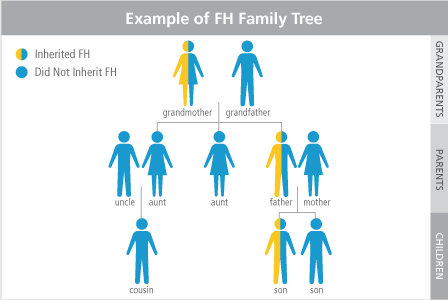
This means it is passed down through families by altered genes, called genetic mutations or gene alterations. It is a serious condition that can result in very high cholesterol levels. This can lead to very aggressive and premature cardiovascular disease.
What causes FH?
FH is not caused by diet or lifestyle. The cause is a faulty gene (called a genetic mutation) that makes the liver not able to remove (metabolize) excess ‘bad cholesterol’ called low-density lipoprotein cholesterol or LDL-C, for short. The result is very high LDL-C levels the body that the body can not remove. Left untreated, high LDL-C levels can lead to early cardiovascular disease. The good news: Early diagnosis and treatment reduces the risk of heart disease so that people with FH can have a normal life expectancy.
Most cholesterol circulating in the body is produced by the liver and is a necessary component in the structure and function of human cells. Individuals with FH are unable to recycle this natural supply of cholesterol that their bodies are constantly producing. Therefore, the cholesterol levels of an individual with FH are exceedingly high and over time the elevated blood cholesterol can lead to blockages in the arteries of the heart and/or brain. FH begins at birth and if is left untreated can cause severe cardiovascular events such as heart attacks, strokes and even narrowing of the heart valves at early age.
How is FH diagnosed?
FH is diagnosed based on a physical exam by your family doctor and lab tests. Your doctor will look for any types of fatty deposits or lensions that are a result of very high cholesterol. Your doctor will also ask about your medical and family history.
Your doctor will need to rule out other causes for increased cholesterol including: renal dysfunction, hepatic disease, diabetes, hypothyroidism, obesity, cigarette smoking and alcohol, and use of some medications, including oral contraceptives. Lab tests include a blood test to check your cholesterol levels.
What are the chances of having a child with FH?
FH is an inherited condition, which means it can be passed from parents to their children. If you have FH, there is a “1-in-2” chance that your child will have FH. If both parents have FH, there is an additional “1-in-4” chance of having a child with Homozygous FH. If you have FH, you should have your child tested between two and ten years of age – or as early as possible after that.
If you are planning to become or are pregnant, you may want to speak with a genetic counsellor for more information on FH.
How is FH diagnosed in children?
If your family has a history of either early heart disease or high cholesterol runs in your family, or you or your partner have FH, it is
highly recommended to get your children tested for FH.
In children, FH is likely if their blood total cholesterol levels are 6.7 mmol/L and 4.0 mmol/L respectively. Some clinics may request heart function (stress test) and/or genetic testing as well.
It is also important to identify other blood relatives who are affected through a process called cascade screening.
Click here to learn more about
cascade screening.
Treatment in children
An early diagnosis, along with a healthy lifestyle including diet and exercise, along with medications to lower cholesterol can significantly reduce the chances your child will develop heart disease as they get older.
FH can cause high levels of LDL-C starting at an early age. Some children as young as 8 years of age may benefit from medications (usually statin).
In adults, FH is likely if your blood total cholesterol level is 7.5 mmol/L or greater, or if your LDL-cholesterol levels are 4.9 mmol/L or greater.In children, FH is likely if their blood total cholesterol levels are 6.7 mmol/L and 4.0 mmol/L respectively. Some clinics may request heart function (stress test) and/or genetic testing as well.
There are two forms of FH:
HeFH – If you have inherited this genetic mutation from one parent, then you will have Heterozygous FH (HeFH). HeFH occurs in 1 in 200 to 500 people worldwide.
HOFH – If you inherit FH from both parents, it is much more severe in its consequences. This form of FH is called Homozygous FH (HoFH). It is very rare, occurring in about 1 in 160,000 to one million people worldwide.
Click here to learn about FH treatments.
Do I have FH?
Wondering if you have FH? There are algorithms and an App to help you:
FH algorithm
Use the following algorithm to help you decide if you may have FH: If you think you have FH, speak to your doctor. There are treatments that can help you.
Wonder if you inherited high cholesterol, or FH? Now there is an App for that!
Download the
CardioRisk Calculator™ App.
Put in your numbers, or use it to talk to your doctor. You will learn pretty quickly whether you have FH and what you can do about it. Try it out:
CardioRisk Calculator™ App
If you do have FH, your family doctor will refer to you to a specialist to explain treatments and screening of your other family members.
Click here to learn about Cascade Screening.

